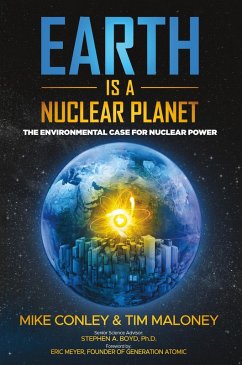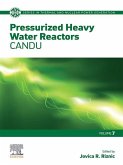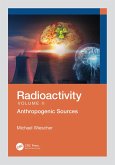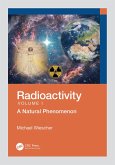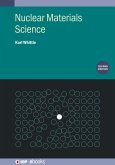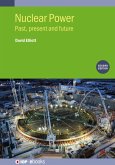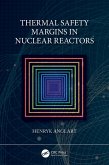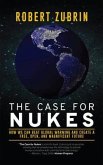Earth Is a Nuclear Planet is a book on nuclear energy unlike any other. It makes the reader feel like a genius by clearly explaining all the relevant basic science in a fun and entertaining way.
Faced by the looming catastrophe of devastating climate change, more and more environmentalists and climate scientists are turning to nuclear power as the cleanest, safest, and ultimately least costly technology for generating the electricity we all need. But there are many myths and conceptions about nuclear energy, irresponsibly hyped by the sensational media, which require to be understood, debunked, and cleared away.
Earth Is a Nuclear Planet goes through all these myths and misconceptions, carefully noting all the fallacies and misunderstandings which plague discussion of the energy options confronting humankind.
Mike Conley and Tim Maloney, two superbly talented popular writers, have spent years questioning a select panel of leading scientists to arrive at a fresh and luminous understanding of the issues surrounding nuclear power. All their factual claims are documented with abundant citations, which some readers will readily skip while others will follow them up. Every scientific claim made in the book has been checked and rechecked a dozen times by fully accredited experts.
On the issue of nuclear safety, Conley and Maloney pay special attention to the notorious accidents, Three Mile Island, Chernobyl, and Fukushima, identifying the misconceptions which prevail, and spotlighting many surprising facts along the way.
Fears of nuclear energy are often completely backward. For example, should a person be more afraid of a radioactive material with a long half-life or a short half-life? Anti-nuclear propaganda encourages more fear of the long half-life material. It's going to be radioactive for a million years! Actually, something that will continue to be radioactive for a long time means it isn't very radioactive right now. All other things being equal (size of sample, type of radiation) material with a short half-life is more dangerous.
I have always known the half-life example of mistaken fear, but I was amazed to see how many examples the authors of Earth Is a Nuclear Planet found. Writing this book must have been an amazing research project. It has 60 pages of endnotes plus 30 pages of supplements. The supplements are more detailed explanations of things like calculations of mining wastes. By relegating some of the heavy-duty material to a separate section, the authors made the main part of the book very readable.
For example, the book has several chapters on the Linear No Threshold (LNT) theory: the title of one chapter is 'No Safe Dose of BS'. LNT claims that there is 'no safe dose' of radiation. Since life on Earth includes background radiation, I guess we are all going to die. Wait, . . . wait, . . . we ARE all going to die! But not of the effects of radiation.
The authors explain that BS in the chapter title means Bad Science. (Of course, it does. Why didn't I notice that?) For me, reading this book was enjoyable as well as informative.
We live on a planet with a great deal of natural radioactivity. There are also many ways in which radioactive material can be used for human health and happiness. This comprehensive book is a guide to our nuclear planet and our nuclear future. Please read it!
Meredith Angwin, author of Shorting the Grid
Faced by the looming catastrophe of devastating climate change, more and more environmentalists and climate scientists are turning to nuclear power as the cleanest, safest, and ultimately least costly technology for generating the electricity we all need. But there are many myths and conceptions about nuclear energy, irresponsibly hyped by the sensational media, which require to be understood, debunked, and cleared away.
Earth Is a Nuclear Planet goes through all these myths and misconceptions, carefully noting all the fallacies and misunderstandings which plague discussion of the energy options confronting humankind.
Mike Conley and Tim Maloney, two superbly talented popular writers, have spent years questioning a select panel of leading scientists to arrive at a fresh and luminous understanding of the issues surrounding nuclear power. All their factual claims are documented with abundant citations, which some readers will readily skip while others will follow them up. Every scientific claim made in the book has been checked and rechecked a dozen times by fully accredited experts.
On the issue of nuclear safety, Conley and Maloney pay special attention to the notorious accidents, Three Mile Island, Chernobyl, and Fukushima, identifying the misconceptions which prevail, and spotlighting many surprising facts along the way.
Fears of nuclear energy are often completely backward. For example, should a person be more afraid of a radioactive material with a long half-life or a short half-life? Anti-nuclear propaganda encourages more fear of the long half-life material. It's going to be radioactive for a million years! Actually, something that will continue to be radioactive for a long time means it isn't very radioactive right now. All other things being equal (size of sample, type of radiation) material with a short half-life is more dangerous.
I have always known the half-life example of mistaken fear, but I was amazed to see how many examples the authors of Earth Is a Nuclear Planet found. Writing this book must have been an amazing research project. It has 60 pages of endnotes plus 30 pages of supplements. The supplements are more detailed explanations of things like calculations of mining wastes. By relegating some of the heavy-duty material to a separate section, the authors made the main part of the book very readable.
For example, the book has several chapters on the Linear No Threshold (LNT) theory: the title of one chapter is 'No Safe Dose of BS'. LNT claims that there is 'no safe dose' of radiation. Since life on Earth includes background radiation, I guess we are all going to die. Wait, . . . wait, . . . we ARE all going to die! But not of the effects of radiation.
The authors explain that BS in the chapter title means Bad Science. (Of course, it does. Why didn't I notice that?) For me, reading this book was enjoyable as well as informative.
We live on a planet with a great deal of natural radioactivity. There are also many ways in which radioactive material can be used for human health and happiness. This comprehensive book is a guide to our nuclear planet and our nuclear future. Please read it!
Meredith Angwin, author of Shorting the Grid
Dieser Download kann aus rechtlichen Gründen nur mit Rechnungsadresse in A, D ausgeliefert werden.

